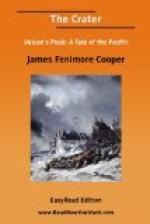After sufficient time had been allowed to make the necessary preparations, the vessels sailed with the immigrants for the Reef. There was many a glad meeting between friends and relatives. Those who had just arrived had a great deal to tell those who had preceded then by eighteen months, and those who now considered themselves old settlers, entertained the new ones with the wonders of their novel situations.
Chapter XXIV.
“Welter upon the waters,
mighty one—
And stretch thee in the ocean’s
trough of brine;
Turn thy wet scales up to
the wind and sun,
And toss the billow from thy
flashing fin;
Heave thy deep breathing to
the ocean’s din,
And bound upon its ridges
in thy pride,
Or dive down to its lowest
depths, and in
The caverns where its unknown
monsters hide
Measure thy length beneath
the gulf-stream’s tide.”
Brainard’s Sea-Serpent.
The colony had now reached a point when its policy must have an eye to its future destinies. If it were intended to push it, like a new settlement, a very different course ought to be pursued from the one hitherto adopted. But the governor and council entertained more moderate views. They understood their real position better. It was true that the Peak, in one sense, or in that which related to soil and products, was now in a condition to receive immigrants as fast as they could come; but the Peak had its limits, and it could hold but a very circumscribed number. As to the group, land had to be formed for the reception of the husbandman, little more than the elements of soil existing over so much of its surface. Then, in the way of trade, there could not be any very great inducement for adventurers to come, since the sandal-wood was the only article possessed which would command a price in a foreign market. This sandal-wood, moreover, did not belong to the colony, but to a people who might, at any moment, become hostile, and who already began to complain that the article was getting to be very scarce. Under all the circumstances therefore, it was not deemed desirable to add to the population of the place faster than would now be done by natural means.




